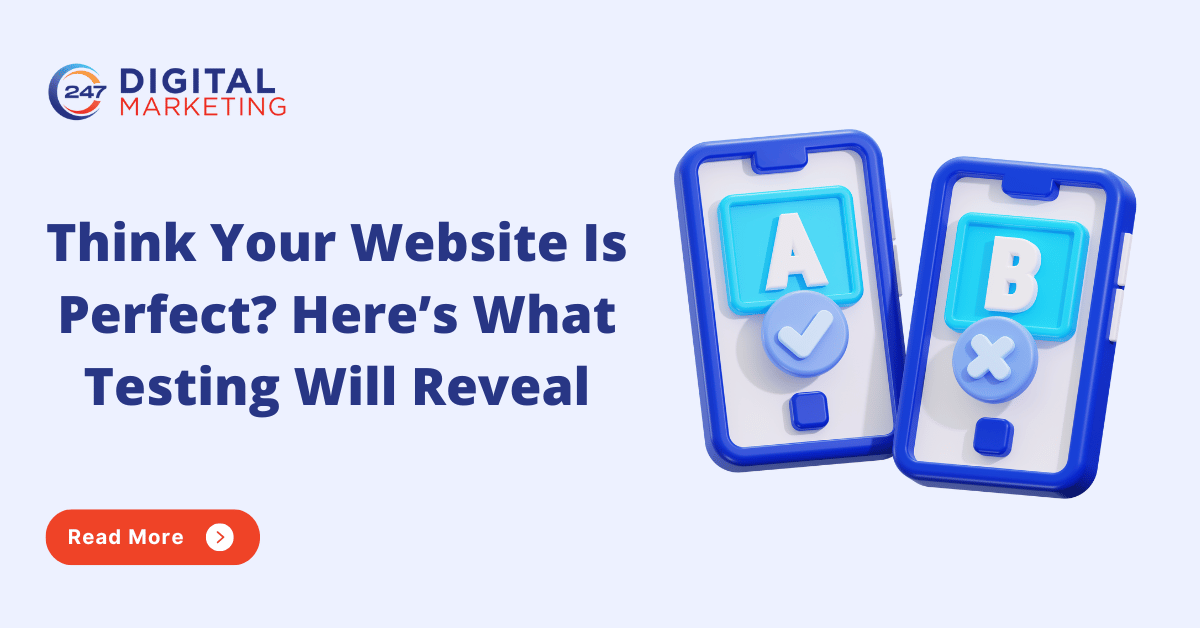Think Your Website Is Perfect? Here’s What Testing Will Reveal

The Illusion of a Perfect Website
You might think your website looks flawless, the design is sleek, the content engaging, and everything seems to work just fine. But behind that shiny surface, there could be hidden issues that only testing can uncover. Think of it like owning a luxury car that looks beautiful but hasn’t had a tune-up in years. One small problem under the hood could cause a breakdown at any time.
The Truth About “Perfection”
Here’s a hard truth: there’s no such thing as a perfect website. Every website has weak points, even the biggest brands. From broken links to security vulnerabilities, the smallest bug can frustrate users or even harm your brand’s reputation. Testing ensures that these problems are caught before they impact your visitors or sales.
What Is Website Testing?
Website testing is the process of evaluating your site’s functionality, usability, performance, and security before (and after) launch. It’s a thorough checkup to make sure your digital product performs smoothly under all conditions.
A Website Testing Company specializes in identifying issues that most businesses miss, using structured methods and automated tools to assess every inch of your platform.
Why Website Testing Is Non-Negotiable
Your website is your brand’s online face. Imagine a visitor clicks on a broken button or experiences a page that takes ten seconds to load; they’re gone, probably for good. Testing helps you avoid these pitfalls, improving both user experience and SEO performance.
Types of Website Testing You Should Know
Testing isn’t one-size-fits-all. Different tests target different areas of your website’s health:
- Functional Testing: Ensures everything works as intended, forms submit correctly, links go to the right places, and buttons respond instantly.
- Usability Testing: Focuses on how easy and enjoyable it is for users to navigate your site.
- Performance Testing: Tests how your website performs under different loads or traffic levels.
- Security Testing: Identifies potential vulnerabilities before hackers do.
- Compatibility Testing: Checks how your site performs on different browsers and devices.
Functional Testing: The Backbone of Quality
Think of functional testing as quality control for your website’s essential operations. It confirms that every interactive element from contact forms to checkout pages works seamlessly. Even one malfunctioning button can cost you conversions.
Usability Testing: Seeing Through the User’s Eyes
Usability testing is all about understanding how real users interact with your website. Can they find what they need easily? Are your CTAs clear and compelling? A confusing layout can make users bounce faster than you can say “404 error.”
Performance Testing: Speed Is the Silent Salesman
A slow website is like a long checkout line that nobody likes to wait in. Performance testing measures how your site handles high traffic, image-heavy pages, and data requests. The faster and smoother the experience, the higher your conversion rates.
Security Testing: Guarding the Gates
In today’s cyber-threat-filled world, website security is non-negotiable. Security testing ensures your users’ data is safe from leaks or attacks. It’s not just about compliance, it’s about trust.
Cross-Browser and Device Testing
Your website might look great on Chrome, but break on Safari or mobile. That’s why testing across browsers and devices is crucial. With the rise of mobile users, a Mobile Application Testing Company can ensure your web app performs flawlessly on every screen.
Automated vs. Manual Testing
Automated testing tools can quickly scan your website for issues, saving time and reducing human error. Manual testing, on the other hand, adds a human touch, perfect for usability and exploratory checks. The best results often come from combining both.
What Testing Reveals in the Real World
Even big brands stumble. A leading e-commerce company once discovered through testing that 20% of its users couldn’t complete checkout due to a hidden bug. Another business found that slow image loading was killing conversions. Without testing, these issues could have cost millions.
How a Web Application Testing Company Can Help
Partnering with a professional Web Application Testing Company brings specialized tools, fresh perspectives, and proven expertise to the table. They perform thorough checks from automation scripts to manual audits, ensuring your site works perfectly under every condition.
Choosing the Best QA & Software Testing Company
When choosing the Best QA Testing Company, look for one with transparent processes, client testimonials, and a history of success. Don’t just go for the cheapest option; go for quality, experience, and scalability. After all, testing isn’t an expense; it’s an investment in your brand’s credibility.
Continuous Testing for Continuous Growth
Testing isn’t a one-time job. Every time you update your website, launch a campaign, or integrate new tools, re-testing is essential. Treat it like ongoing maintenance for your digital ecosystem.
Conclusion
No website is truly perfect, but testing gets you as close as possible. It uncovers hidden issues, strengthens user experience, and protects your reputation. Think of it as your digital insurance, one that pays off with smoother performance, happier users, and higher conversions. If you want your site to perform like a dream, partnering with a reliable testing partner is the smartest move you can make.
Mitesh Patel is the co-founder of 247 Digital Marketing, LawFirm Marketing and a columnist. He helps companies like Emerson and other top Fortune 500 compnies to grow their revenue.





